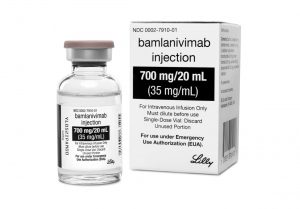Promising new therapy for COVID-19 cleared by U.S., still under review by Health Canada

The U.S. Food and Drug Administration has just given the green light to a promising monoclonal antibody therapy co-developed by Canadian scientists to treat mild to moderate coronavirus infections — a groundbreaking product that’s still hasn’t been approved by Health Canada for use in this country.
The antibody treatment, called bamlanivimab, produced positive results in clinical trials and reduced the severity of COVID-19 in patients with underlying health conditions (such as diabetes, chronic kidney disease, obesity or being over the age of 65) while also cutting hospitalization rates.
U.S. data show that people with comorbidities — two or more medical conditions at one time — are far more likely to die from COVID-19. This drug could help reduce those mortality rates.
Monoclonal antibodies are laboratory-made proteins that mimic the immune system’s ability to fight off harmful antigens such as viruses. Bamlanivimab is specifically designed to block the SARS-CoV-2 virus from attaching to human cells.
The antibody in question, LY-CoV555, was discovered by scientists at Vancouver-based AbCellera in collaboration with the National Institute of Allergy and Infectious Diseases Vaccine Research Center (VRC). The treatment was co-developed with U.S. pharmaceutical giant Eli Lilly.
“This is a game-changer in the sense that it can intervene at a critical point in the disease to prevent it from progressing to a more dangerous stage, especially for patients who are high-risk,” Dr. Doron Sagman, the vice-president for R&D and medical affairs at Eli Lilly Canada, told CBC News.

“We hope it will make a meaningful contribution … as a bridge to vaccines,” Sagman said, adding that such therapies are still going to be needed after a vaccine is released.
“Some people, especially those who are immunocompromised or the elderly, may not have a full, robust response to vaccines. So that’s going to be very important.”
While the clinical data were submitted to U.S. and Canadian regulators for approvals at roughly the same time in early October, Health Canada said it is not yet ready to approve the drug and its review process continues.
“Health Canada is committed to reviewing COVID-19 medications and vaccines in an expedited manner. However, our top priority is to provide Canadians with access to safe, high quality and effective medications and vaccines,” a spokesperson for the department said.
“Although Health Canada has received some applications, all the necessary data supporting a vaccine or treatment approval have not yet been received. The decision on vaccine and treatment approval will be made based on the evidence submitted by the sponsors.”
Sagman said Eli Lilly has supplied data on the drug to Health Canada using the agency’s new rolling review process, which allows companies to submit clinical trial results as soon as they’re available. This process allows drug makers to compress the lengthy timelines they normally face when bringing a new product to market.
“We have been in active discussions with Health Canada about that regulatory process,” Sagman said, adding distribution of the drug is on pause here until Health Canada renders its decision.
“We’re partnering with governments across the world to ensure a fair, transparent allocation of a limited supply for those who need it. It’s going to be difficult to meet the needs of the entire worldwide population but we’re going to do what we can.”

The U.S. government reached a $375 million deal with Eli Lilly this summer to supply some 300,000 vials of the antibody treatment. The company will begin fulfilling those orders now that the FDA has given it the go-ahead. The treatment’s U.S. approval is a welcome development for a country that is posting a record number of COVID-19 cases daily.
Canada has not yet brokered a purchase agreement like that, Sagman said, but “there will be opportunities for the government” to make a similar bulk buying deal if and when Health Canada signs off on the therapeutic.
A spokesperson for the company said it expects to supply as many as 1 million doses of bamlanivimab to the global market by the end of 2020, with millions more to follow next year.
Doctors at Walter Reed Military Medical Centre prescribed a similar antibody cocktail from another firm, Regeneron, to U.S. President Donald Trump when he contracted the virus in October. At the time, the monoclonal treatment was considered experimental and was not authorized for use on most patients.
Trump touted the drug regime as a “cure.” It’s not — but some scientists have said the treatment could greatly reduce the stress on health care systems by reducing the number of hospitalizations.
The drug reduced the rate of hospitalization and emergency room visits among patients at high risk for disease progression, Eli Lilly said when publishing its findings in the peer-reviewed New England Journal of Medicine.
Among patients facing a high risk of disease progression, hospitalizations and emergency room visits occurred in just 3 per cent of bamlanivimab-treated cases on average, compared to 10 per cent in placebo-treated patients, the FDA said in issuing its emergency user authorization (EUA) Monday.
“What we’ve learned is that it’s important to intervene early to reduce the viral load before it progresses to a more advanced inflammatory stage requiring hospital-based interventions,” Sagman said. “This should be administered as soon as possible after a COVID-19 test.”
Authorizing the treatment “provides health care professionals on the frontline of this pandemic with another potential tool in treating COVID-19 patients,” Dr. Patrizia Cavazzoni, acting director of the FDA’s Centre for Drug Evaluation and Research, said in a statement.
The U.S. regulator said the treatment, which is delivered through intravenous injection in a health care setting, should only be used on patients in the early stages of infection because the treatment “may be associated with worse clinical outcomes” for people who are already in hospital for COVID-19-related complications.








Redes Sociais - Comentários